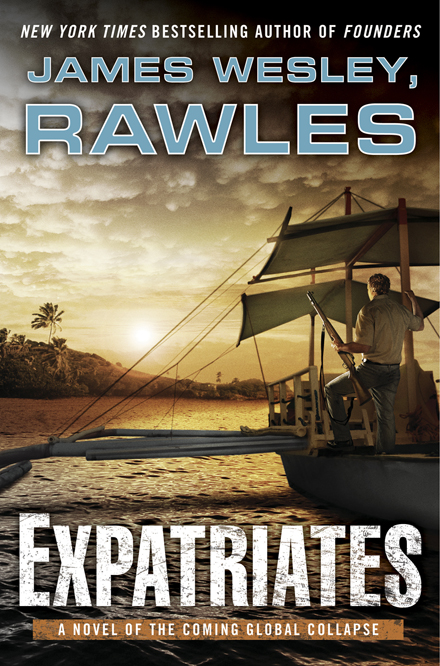Introductory Note: The following is an edited transcript of my conversation with my Publicist from E.P. Dutton, Emily Brock:
1.) Expatriates is the fourth novel in your Coming Collapse series. What inspired you to write about survivalism? Do you believe a real-life collapse is in our near future?
I believe that global economic instability is rising substantially, so the risk of economic collapse is greater than ever before. Along with instability comes the risk of civil wars, regional wars, and perhaps even a Third World War. It is indeed time for people to stock up, team up, and batten down the hatches.
2.) Expatriates is different from your other novels in that it mainly takes place outside the United States, in Australia. What drew you to writing about characters away from their native country?
There are now more than 5.25 million American citizens living overseas. I recognized that the stress that they would go through in the event of a global collapse would be tremendous. There is nothing quite like being stranded in a foreign country. And to be simultaneously cut off from any information about the well-being of your relatives would be devastating. So I saw this as both an opportunity to avoid any trodden ground from my previous novels, and as way to to describe some times of truly deep drama.
But it is notable that one of the storylines in Expatriates takes place in Central Florida, where there is also plenty of excitement.
3.) Both survivalism and religion play a large role in Expatriates. How do you see those two aspects balancing in the novel?
I consider them complimentary. Being well-stocked allows survivalists to dispense Christian charity. The deeper your larder, the more generous you can be.
4.) Tell me a little bit about your writing process. How do you begin to formulate your plots and characters?
The plots of my novels are essentially extrapolations of current trends. The characters portray people from all walks of life. By showing both prepared and unprepared individuals, it allows me to show the breadth and depth of what is really required to pull through traumatic times or starvation, infrastructure disruption, and severe shortages.
5.) Are the personalities of the characters in Expatriates modeled after survivalists and friends you know?
Many of the characters in my earlier novels were drawn directly on the personalities and backgrounds of my close friends. But in Expatriates, I have fictionalized the lives of a few of my blog readers whom I’ve never met in person. A few of these characters combine the personas of several people.
6.) Some of the topics that arise in the novel, such as Islamic extremism and gun ownership, could be construed as very controversial. Was this your intention?
My intent was not to stir up angst or animus, but I have never been one to shy away from speaking out on key societal issues. For instance, I have been very outspokenly pro-Christian, Pro-Preparedness, pro-Gun Ownership, Anti-Racist, and Anti-Slavery. (Most Americans don’t realize that slavery is still being practiced in North Africa.)
The rise of Radical Islam is quite troubling. And if observed from a multi-generational perspective, it is genuinely frightening.
The right to keep and bear arms is the crucial cornerstone of the Bill of Rights. In effect, it is the right that insures all of our others. I believe that the current statist efforts to disarm the citizenry are not just misguided but inherently evil. It is as if they foolishly want to make us all victims. As I’ve been quoted before: The Second Amendment is about protecting your right to go deer hunting the same way that the First Amendment is about protecting your right to publish poetry.
7.) You have mentioned in the past that you hope readers will learn as much as possible about survivalism through reading your novels. You have written non-fiction guides in the past, but do you believe that fiction is a better medium to get your message across?
We live in an age of information overload. We are bombarded with television, radio, magazines, billboards, web pages, blogs, and text messages. In this era, most people won’t take the time to sit down and read a survival manual. But there is something captivating about novels. By weaving a lot of practical and tactical tips into a fictional storyline, I can keep people’s attention. Many readers tell me that they read my novels twice: The first time through for fun, and the second time highlighting passages and taking notes.










